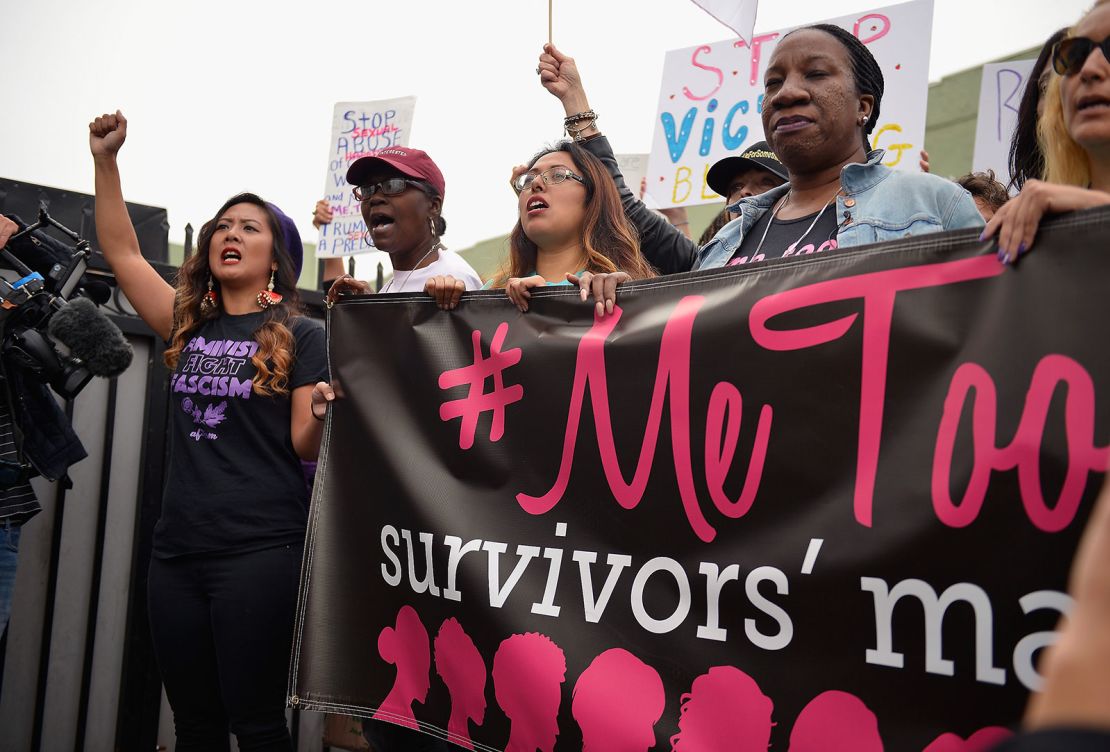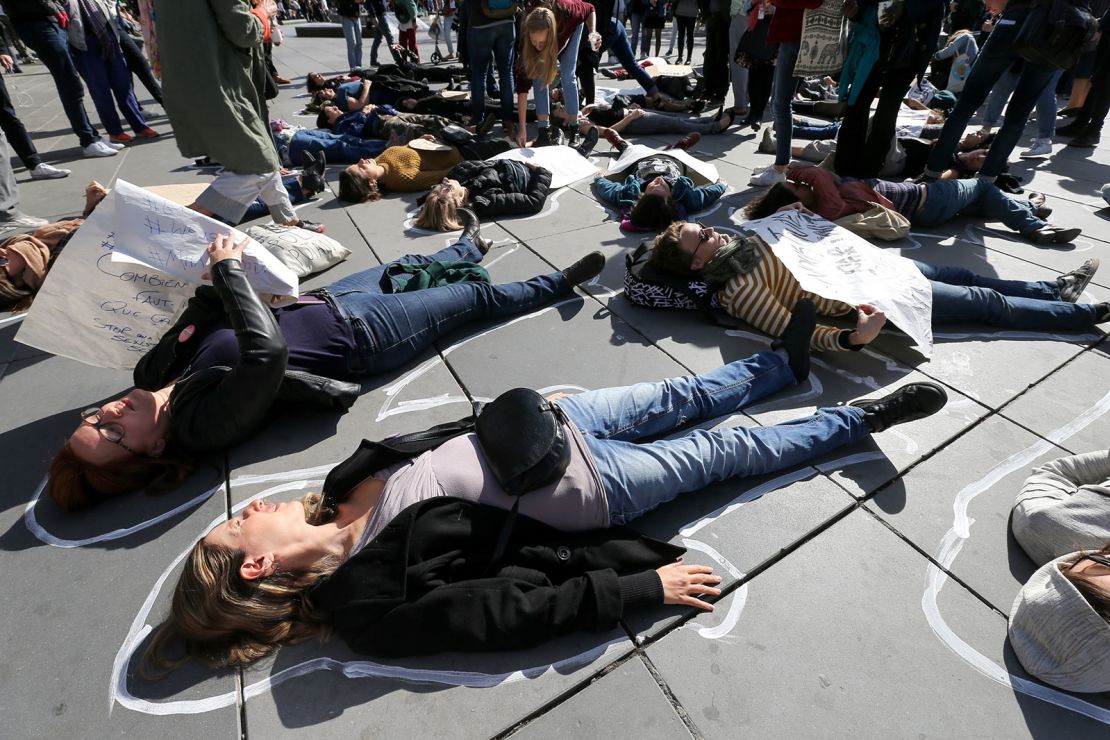CNN
—
At one point during Sean “Diddy” Combs’ federal criminal sex trafficking and racketeering trial, defense attorney Brian Steel asked a witness, who was testifying under a pseudonym, if she retained counsel in order to “join the #MeToo money grab against Mr. Combs.”
The question came during one of the three days the woman, referred to on the stand as “Mia,” testified about multiple alleged instances of physical, emotional and sexual abuse by Combs. Though the question was sustained by the judge, the moment speaks to the movement that looms large over two high-profile cases that are taking place in courts mere blocks from one another in New York City.
Combs, 55, has pleaded not guilty to charges of racketeering conspiracy, sex trafficking and transportation to engage in prostitution.
Meanwhile, in a state court, disgraced movie mogul Harvey Weinstein – whose initial fall from grace was the impetus for #MeToo going viral in 2017 – will soon face a verdict in his sex crimes retrial. Weinstein, 73, has also pleaded not guilty to all the charges.
Empowering survivors was at the heart of the #MeToo movement that gained wide awareness as a hashtag in 2017, but it started more than a decade before that, when it was founded by survivor and activist Tarana Burke.

CNN’s Elizabeth Wagmeister recently sat with Burke for “Laura Coates Live” to discuss where the #MeToo movement stands now.
#MeToo bills itself as “a global, and survivor-led, movement against sexual violence,” according to its website. The founder of the movement stressed one vital point: outside of legal consequences within the justice system, most survivors of gender-based and intimate partner sexual assault or violence simply want to be acknowledged and believed.
This conversation has been edited for clarity and condensed.
CNN: This is obviously your life’s work, but #MeToo came into the public forum in 2017. How are things different today than they were in 2017?
TARANA BURKE: I think there’s some significant differences. People have language now to talk about this thing that we couldn’t talk about, at least publicly.
After Me Too, survivors know that they can say, ‘I had this experience.’ Even if they don’t want anything to happen – they’re not trying to get anybody arrested, they’re not trying to have some sort of remedy happen – but they can say out loud, ‘This thing happened to me.’ And it should be acknowledged. I think that we don’t understand what it feels like to be acknowledged for something incredibly traumatic and painful that happened to you that you then swallowed, and that society tells you is your shame.
There’s a lot left to do. There’s a lot left to happen, and I think sometimes people try to quantify it based on numbers of cases and who went to jail, but the real way to quantify it is about numbers of survivors and people who’ve been able to say, “Me too,” and that that process has opened up something for them, something cathartic, something healing.
I think people are also more knowledgeable about sexual violence in a way that we weren’t before 2017.
CNN: How important were the initial allegations against Harvey Weinstein symbolically for the movement?
BURKE: It was huge. We actually would not be here without that happening, and I think it’s fair to always acknowledge those survivors who came forward around Harvey Weinstein, because technically that’s pre-#MeToo. There was no impetus from the public, there was no guarantee of what was going to happen to those women afterwards. Weinstein was one of the most powerful men in Hollywood, who could just like that take away somebody’s career. So the bravery of those women should never be diminished.
CNN: Weinstein’s New York sex crimes conviction was overturned last year, and he is currently back on trial. What was your reaction when that conviction was overturned?
BURKE: Surprise, but also not deep concern.
This movement is not really about how many of these people can we get in jail; it’s about upending the American justice system. We have to do something completely different.
In reality, the conviction rate for sexual violence in this country is very, very low. So the act of getting a Harvey Weinstein in a courtroom is monumental. It really is. We cannot understate what it takes to get somebody as powerful as Diddy (Sean Combs) or Weinstein or R. Kelly or these various people into a courtroom, to get them past the different steps in that process. Getting to conviction though is a whole other feat by itself.

CNN: Can you talk about how Cassie Ventura filed under the Adult Survivors Act and how that ultimately contributed to this criminal trial against Combs? (Ventura filed a civil suit against Combs, which was quickly settled.)
BURKE: One of the things that I’ve heard almost consistently since #MeToo went viral is, ‘When is this going to come to hip-hop?’ There’s been so many stories, allegations, rumors throughout the years about the misogyny that exists inside of hip-hop. I had a number of people tell (me) their personal stories, but when I would ask these women – most of the time Black women who were in the industry, some well-known – and say, ‘Why don’t you talk about it?’ they would say, ‘Oh, I would be completely canceled.’
And that’s the tide that has turned, and the significance of what Cassie did. The significance of that lookback law is that this was years after #MeToo. We were five years or more past the hashtag going viral. Black women and women of color, particularly in the music industry and hip-hop, had not had their moment – and I would submit still probably haven’t had their moment.
CNN: If Sean Combs is acquitted, what do you think happens with his power and standing in the industry?
BURKE: You know, there’s two separate parts of the power. There’s the power of being a Diddy, Puffy, the public figure, but then there’s always the power of money.
If he walks away from this case by some miracle – or maybe not a miracle – we need to be talking about what we all witnessed together. You can’t unring this bell. We all listened to Cassie. We all saw that video. We’ve heard this testimony that’s not going anywhere. We sometimes have short memories though. One apology video, one great produced song, and (he could) start building (himself) back. I think we have to have a longer memory. So regardless of the outcomes of these trials, (I hope) that we have an institutional memory of what we saw.
And don’t doubt and don’t gaslight yourself. Don’t doubt your own eyes and ears. We saw that man beat that woman in that hotel. Whatever the reasons behind it, we saw what we saw.
CNN: Are you concerned about the optics of the #MeToo movement right now in media and on social media?
BURKE: It concerns me. You have young people who are graduating high school, even graduating college, that were very young when #MeToo went viral. So they have some understanding, they’ve grown up in a world with this language and with this sort of new understanding. But social media is really effective. And so when you start having people pick apart these things and say, ‘This was a conspiracy,’ that concerns me because whoever holds the narrative holds the key. And that is a really powerful place to sit when you have ability to shape narrative around a particular topic.
The psychology behind survivorship is so complicated, and so complex that the average everyday person watching at home and giving their analysis cannot understand it unless they’ve actually been through it. And sometimes even when they’ve been through it, because each of us respond differently.

CNN: What is next for the #MeToo movement? What work are you focused on now?
BURKE: We’re really focused on safety. I think that #MeToo has been really bogged down by this narrative that it’s about going out and getting people, and we’ve forgotten the thread that most survivors want to protect other survivors. And so we are really focused on, what does it look like to end sexual violence? What does it look like to solve the issue of sexual violence, because this is a solvable issue. We deal with healing and action. A lot of that action is how do we keep more people from not from not having to say, ‘Me too.’


